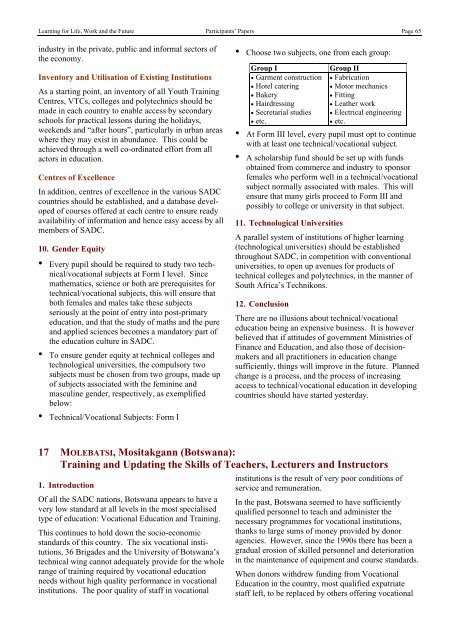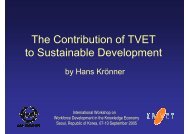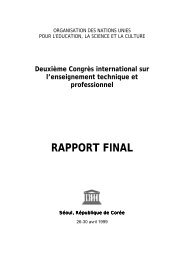Learning for Life, Work and the Future Initial ... - Unesco-Unevoc
Learning for Life, Work and the Future Initial ... - Unesco-Unevoc
Learning for Life, Work and the Future Initial ... - Unesco-Unevoc
Create successful ePaper yourself
Turn your PDF publications into a flip-book with our unique Google optimized e-Paper software.
<strong>Learning</strong> <strong>for</strong> <strong>Life</strong>, <strong>Work</strong> <strong>and</strong> <strong>the</strong> <strong>Future</strong> Participants’ Papers Page 65<br />
industry in <strong>the</strong> private, public <strong>and</strong> in<strong>for</strong>mal sectors of<br />
<strong>the</strong> economy.<br />
Inventory <strong>and</strong> Utilisation of Existing Institutions<br />
As a starting point, an inventory of all Youth Training<br />
Centres, VTCs, colleges <strong>and</strong> polytechnics should be<br />
made in each country to enable access by secondary<br />
schools <strong>for</strong> practical lessons during <strong>the</strong> holidays,<br />
weekends <strong>and</strong> “after hours”, particularly in urban areas<br />
where <strong>the</strong>y may exist in abundance. This could be<br />
achieved through a well co-ordinated ef<strong>for</strong>t from all<br />
actors in education.<br />
Centres of Excellence<br />
In addition, centres of excellence in <strong>the</strong> various SADC<br />
countries should be established, <strong>and</strong> a database developed<br />
of courses offered at each centre to ensure ready<br />
availability of in<strong>for</strong>mation <strong>and</strong> hence easy access by all<br />
members of SADC.<br />
10. Gender Equity<br />
• Every pupil should be required to study two technical/vocational<br />
subjects at Form I level. Since<br />
ma<strong>the</strong>matics, science or both are prerequisites <strong>for</strong><br />
technical/vocational subjects, this will ensure that<br />
both females <strong>and</strong> males take <strong>the</strong>se subjects<br />
seriously at <strong>the</strong> point of entry into post-primary<br />
education, <strong>and</strong> that <strong>the</strong> study of maths <strong>and</strong> <strong>the</strong> pure<br />
<strong>and</strong> applied sciences becomes a m<strong>and</strong>atory part of<br />
<strong>the</strong> education culture in SADC.<br />
• To ensure gender equity at technical colleges <strong>and</strong><br />
technological universities, <strong>the</strong> compulsory two<br />
subjects must be chosen from two groups, made up<br />
of subjects associated with <strong>the</strong> feminine <strong>and</strong><br />
masculine gender, respectively, as exemplified<br />
below:<br />
• Technical/Vocational Subjects: Form I<br />
• Choose two subjects, one from each group:<br />
Group I<br />
• Garment construction<br />
• Hotel catering<br />
• Bakery<br />
• Hairdressing<br />
• Secretarial studies<br />
• etc.<br />
Group II<br />
• Fabrication<br />
• Motor mechanics<br />
• Fitting<br />
• Lea<strong>the</strong>r work<br />
• Electrical engineering<br />
• etc.<br />
• At Form III level, every pupil must opt to continue<br />
with at least one technical/vocational subject.<br />
• A scholarship fund should be set up with funds<br />
obtained from commerce <strong>and</strong> industry to sponsor<br />
females who per<strong>for</strong>m well in a technical/vocational<br />
subject normally associated with males. This will<br />
ensure that many girls proceed to Form III <strong>and</strong><br />
possibly to college or university in that subject.<br />
11. Technological Universities<br />
A parallel system of institutions of higher learning<br />
(technological universities) should be established<br />
throughout SADC, in competition with conventional<br />
universities, to open up avenues <strong>for</strong> products of<br />
technical colleges <strong>and</strong> polytechnics, in <strong>the</strong> manner of<br />
South Africa’s Technikons.<br />
12. Conclusion<br />
There are no illusions about technical/vocational<br />
education being an expensive business. It is however<br />
believed that if attitudes of government Ministries of<br />
Finance <strong>and</strong> Education, <strong>and</strong> also those of decisionmakers<br />
<strong>and</strong> all practitioners in education change<br />
sufficiently, things will improve in <strong>the</strong> future. Planned<br />
change is a process, <strong>and</strong> <strong>the</strong> process of increasing<br />
access to technical/vocational education in developing<br />
countries should have started yesterday.<br />
17 MOLEBATSI, Mositakgann (Botswana):<br />
Training <strong>and</strong> Updating <strong>the</strong> Skills of Teachers, Lecturers <strong>and</strong> Instructors<br />
1. Introduction<br />
Of all <strong>the</strong> SADC nations, Botswana appears to have a<br />
very low st<strong>and</strong>ard at all levels in <strong>the</strong> most specialised<br />
type of education: Vocational Education <strong>and</strong> Training.<br />
This continues to hold down <strong>the</strong> socio-economic<br />
st<strong>and</strong>ards of this country. The six vocational institutions,<br />
36 Brigades <strong>and</strong> <strong>the</strong> University of Botswana’s<br />
technical wing cannot adequately provide <strong>for</strong> <strong>the</strong> whole<br />
range of training required by vocational education<br />
needs without high quality per<strong>for</strong>mance in vocational<br />
institutions. The poor quality of staff in vocational<br />
institutions is <strong>the</strong> result of very poor conditions of<br />
service <strong>and</strong> remuneration.<br />
In <strong>the</strong> past, Botswana seemed to have sufficiently<br />
qualified personnel to teach <strong>and</strong> administer <strong>the</strong><br />
necessary programmes <strong>for</strong> vocational institutions,<br />
thanks to large sums of money provided by donor<br />
agencies. However, since <strong>the</strong> 1990s <strong>the</strong>re has been a<br />
gradual erosion of skilled personnel <strong>and</strong> deterioration<br />
in <strong>the</strong> maintenance of equipment <strong>and</strong> course st<strong>and</strong>ards.<br />
When donors withdrew funding from Vocational<br />
Education in <strong>the</strong> country, most qualified expatriate<br />
staff left, to be replaced by o<strong>the</strong>rs offering vocational





